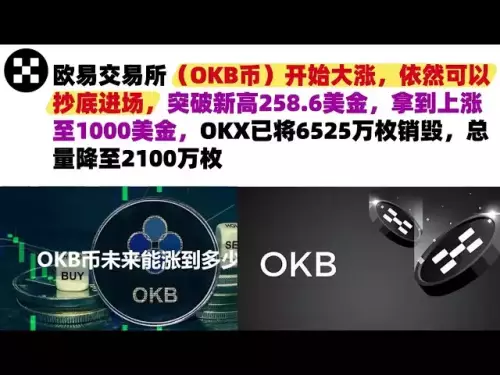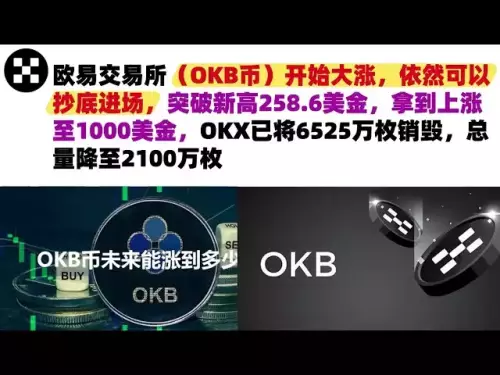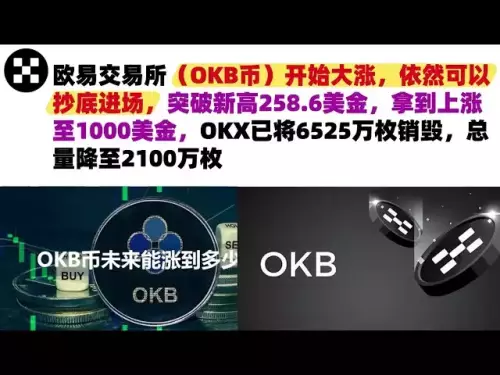-
 Bitcoin
Bitcoin $108800
0.62% -
 Ethereum
Ethereum $4358
0.91% -
 Tether USDt
Tether USDt $1.000
0.01% -
 XRP
XRP $2.807
-0.03% -
 BNB
BNB $859.1
0.49% -
 Solana
Solana $201.3
-0.52% -
 USDC
USDC $0.0000
0.00% -
 Dogecoin
Dogecoin $0.2154
2.38% -
 TRON
TRON $0.3382
0.59% -
 Cardano
Cardano $0.8182
0.47% -
 Chainlink
Chainlink $23.39
0.75% -
 Hyperliquid
Hyperliquid $44.21
0.71% -
 Ethena USDe
Ethena USDe $1.001
0.02% -
 Sui
Sui $3.290
2.03% -
 Stellar
Stellar $0.3567
-0.05% -
 Bitcoin Cash
Bitcoin Cash $543.3
1.96% -
 Cronos
Cronos $0.3164
17.71% -
 Avalanche
Avalanche $23.74
1.91% -
 Hedera
Hedera $0.2252
-0.09% -
 UNUS SED LEO
UNUS SED LEO $9.513
0.62% -
 Litecoin
Litecoin $110.1
0.80% -
 Toncoin
Toncoin $3.128
2.55% -
 Shiba Inu
Shiba Inu $0.00001235
2.77% -
 Uniswap
Uniswap $9.677
2.17% -
 Polkadot
Polkadot $3.772
0.91% -
 Dai
Dai $0.0000
0.01% -
 Bitget Token
Bitget Token $4.536
0.36% -
 Aave
Aave $317.0
2.25% -
 Monero
Monero $257.2
0.13% -
 Ethena
Ethena $0.6557
3.59%
What is a security token versus a utility token?
Security tokens offer investors ownership and regulated returns, while utility tokens provide access to services but face scrutiny over potential classification as securities.
Aug 30, 2025 at 03:00 pm
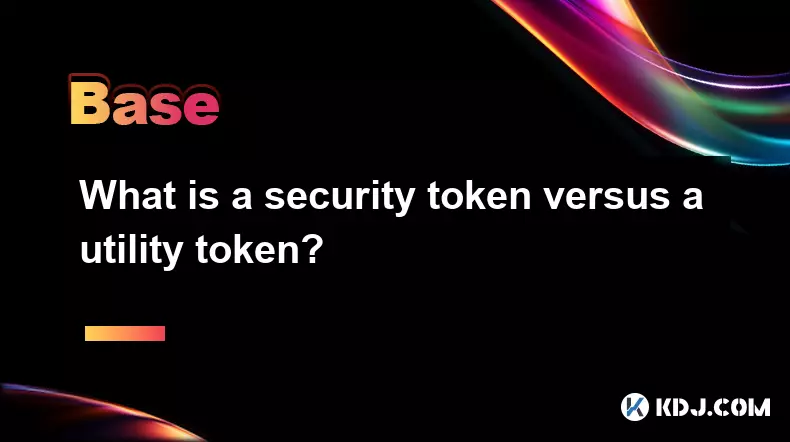
Understanding Security Tokens
1. Security tokens represent ownership in an external asset or enterprise, often resembling traditional financial instruments like stocks or bonds. These tokens are subject to federal securities regulations because they are considered investments.
2. When investors purchase security tokens, they typically expect profits derived from the efforts of others, such as company revenues or capital appreciation. This aligns with the Howey Test, a framework used by regulators to determine if an asset qualifies as a security.
3. Issuers of security tokens must comply with strict regulatory requirements, including registration with financial authorities and providing detailed disclosures about the project, team, and financials. This transparency aims to protect investors from fraud and misinformation.
4. Because of their regulatory burden, security tokens are often issued by established companies or funds seeking to tokenize real-world assets like real estate, equity, or revenue streams. These tokens can offer dividends, profit-sharing, or voting rights.
5. Security tokens are tightly linked to legal frameworks and investor protections, making them more complex to issue but potentially more trustworthy for institutional investors.
Distinguishing Utility Tokens
1. Utility tokens are designed to provide access to a product or service within a blockchain ecosystem. They are not intended as investments but rather as functional components of a decentralized network.
2. These tokens are typically distributed during initial coin offerings (ICOs) to raise funds for development, with the promise that they will be usable once the platform launches. For example, a utility token might be required to pay for transaction fees or cloud storage on a network.
3. Unlike security tokens, utility tokens are not supposed to offer financial returns based on the work of others. Their value is tied to demand for the platform’s services rather than investment performance.
4. Regulators often scrutinize utility tokens to ensure they do not function as de facto securities, especially if early buyers expect price appreciation due to project development.
5. Many high-profile projects have faced legal challenges when their utility tokens were deemed securities by authorities, leading to fines or forced refunds. This highlights the fine line between utility and investment intent.
Regulatory Implications and Market Perception
1. The classification of a token as security or utility has profound implications for compliance, fundraising, and global distribution. Misclassification can result in severe penalties and loss of investor trust.
2. Jurisdictions like the United States apply the Howey Test rigorously, while others such as Switzerland or Singapore have more nuanced frameworks that consider the token’s purpose and functionality.
3. Market participants closely watch regulatory announcements, as they can trigger sharp price movements and influence project roadmaps.
4. Institutional investors tend to favor security tokens due to their legal clarity and enforceable rights, whereas retail users may prefer utility tokens for speculative opportunities or ecosystem participation.
5. Projects often structure token economics carefully to avoid being classified as securities, sometimes implementing delayed functionality or decentralized governance to reduce central control.
Frequently Asked Questions
What determines whether a token is a security?A token is considered a security if it meets the criteria of the Howey Test: it involves an investment of money, in a common enterprise, with the expectation of profit from the efforts of others. Regulatory bodies assess marketing materials, token distribution, and economic structure to make this determination.
Can a utility token become a security over time?Yes, if the way a utility token is marketed or used changes such that investors expect profits from the efforts of the issuing team, regulators may reclassify it as a security. This often happens when secondary market trading dominates over actual utility usage.
Are security tokens more valuable than utility tokens?Value is not inherently tied to classification. Some utility tokens have reached high market valuations due to strong demand for their networks, while some security tokens maintain stable value through dividend payouts. Market dynamics, adoption, and utility drive value more than category alone.
How do investors benefit from holding security tokens?Investors may receive dividends, equity-like ownership, voting rights, or a share of revenue. These benefits are contractually defined and often enforced through smart contracts or legal agreements, offering more structured returns compared to utility tokens.
Disclaimer:info@kdj.com
The information provided is not trading advice. kdj.com does not assume any responsibility for any investments made based on the information provided in this article. Cryptocurrencies are highly volatile and it is highly recommended that you invest with caution after thorough research!
If you believe that the content used on this website infringes your copyright, please contact us immediately (info@kdj.com) and we will delete it promptly.
- Layer Brett vs. Dogecoin Pepe: The Meme Coin Evolution
- 2025-08-31 02:45:15
- Dogecoin, Staking Rewards, and Layer Brett: The Meme Coin Evolution
- 2025-08-31 02:45:15
- Pudgy Party: How Pudgy Penguins are Revolutionizing Web3 Gaming with Skins and PENGU Tokens
- 2025-08-31 03:05:12
- BlockDAG's Hybrid Tech & Presale Challenge: A 2025 Crypto Game-Changer
- 2025-08-31 03:10:12
- Elon Musk, Dogecoin, and the Treasury: A New Chapter for Meme Coins?
- 2025-08-31 01:05:16
- MemeCore's Wild Ride: Rallying to ATH and Beyond!
- 2025-08-31 01:10:13
Related knowledge

What is the halving in Bitcoin?
Aug 30,2025 at 10:18pm
Understanding Bitcoin Halving1. The Bitcoin halving is an event coded into the blockchain’s protocol that reduces the reward miners receive for valida...
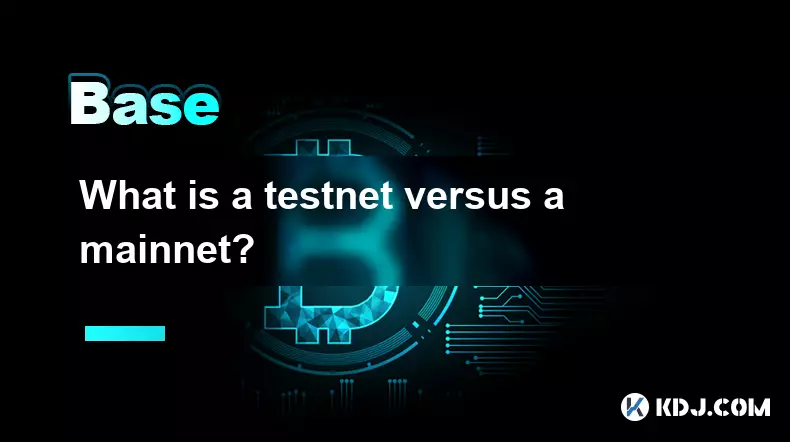
What is a testnet versus a mainnet?
Aug 30,2025 at 06:54pm
Understanding the Role of Testnets in Blockchain Development1. A testnet serves as a parallel blockchain environment designed specifically for develop...

What are crypto faucets?
Aug 30,2025 at 08:10am
Understanding Crypto Faucets1. Crypto faucets are online platforms that distribute small amounts of cryptocurrency to users for completing simple task...

What are privacy coins?
Aug 30,2025 at 06:18am
Understanding Privacy Coins in the Cryptocurrency Ecosystem1. Privacy coins are a category of cryptocurrencies specifically designed to enhance transa...

What is a security token versus a utility token?
Aug 30,2025 at 03:00pm
Understanding Security Tokens1. Security tokens represent ownership in an external asset or enterprise, often resembling traditional financial instrum...
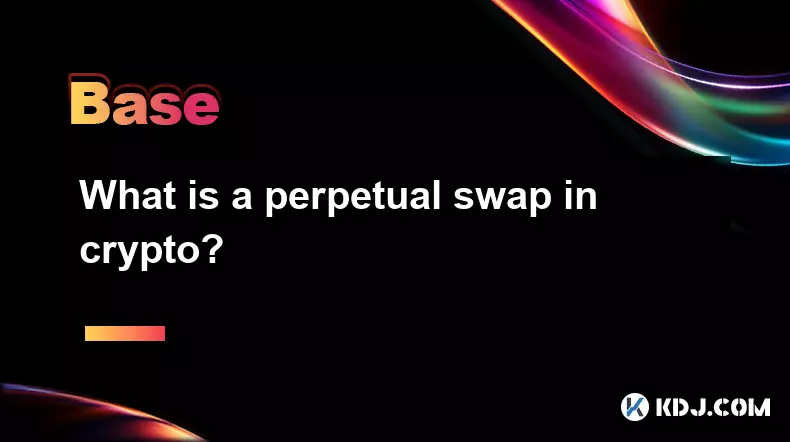
What is a perpetual swap in crypto?
Aug 30,2025 at 12:55am
Understanding Perpetual Swaps in the Cryptocurrency Market1. A perpetual swap is a type of derivative contract that allows traders to speculate on the...

What is the halving in Bitcoin?
Aug 30,2025 at 10:18pm
Understanding Bitcoin Halving1. The Bitcoin halving is an event coded into the blockchain’s protocol that reduces the reward miners receive for valida...

What is a testnet versus a mainnet?
Aug 30,2025 at 06:54pm
Understanding the Role of Testnets in Blockchain Development1. A testnet serves as a parallel blockchain environment designed specifically for develop...

What are crypto faucets?
Aug 30,2025 at 08:10am
Understanding Crypto Faucets1. Crypto faucets are online platforms that distribute small amounts of cryptocurrency to users for completing simple task...

What are privacy coins?
Aug 30,2025 at 06:18am
Understanding Privacy Coins in the Cryptocurrency Ecosystem1. Privacy coins are a category of cryptocurrencies specifically designed to enhance transa...

What is a security token versus a utility token?
Aug 30,2025 at 03:00pm
Understanding Security Tokens1. Security tokens represent ownership in an external asset or enterprise, often resembling traditional financial instrum...

What is a perpetual swap in crypto?
Aug 30,2025 at 12:55am
Understanding Perpetual Swaps in the Cryptocurrency Market1. A perpetual swap is a type of derivative contract that allows traders to speculate on the...
See all articles























